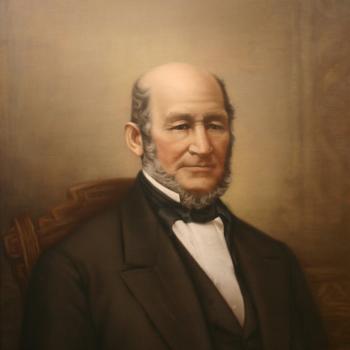
It’s hard for me to believe, but I’ve been following the whole “homosexuality and the church” debate for about ten years now—even farther back than the court decision which effectively made gay marriage the law of the land. My thinking on the issue had in fact been taking shape long before that, as I watched how different Christian subcultures mapped out their respective territories around it.
In particular, these were the early years of a blog called Spiritual Friendship. For those not in the know, this was a loose, denominationally diverse band of Christian writers who identified as gay or lesbian, wanting to carve out a “third way” between permissive progressivism and what they perceived as rigid conservatism. At the time, they were so disorganized that they didn’t really have a clear umbrella term with which to describe themselves, but one bit of jargon they used that became more popular as the years wore on was the language of “Side A” vs. “Side B.” “Side A” referred to theological revisionists like Matthew Vines and Justin Lee, who believe God blesses same-sex unions. But the precise specifications of “Side B” Christianity were less clear.
As the history has been told, the phrase was first born roughly twenty years ago on a message board with a variety of different voices. Justin Lee was one of them. Others were formerly promiscuous converts with ties to Christian ex-gay culture. Others were still virgins. Some felt comfortable identifying as “gay,” others didn’t. To get away from words and phrases that could fudge like “conservative,” “traditional,” “progressive,” “liberal,” etc., they decided to come up with new ones. In that original twenty-year-old context, “Side B” was meant to refer simply to Christians who were attracted to the same sex but didn’t believe God blessed gay sex acts. Needless to say, this was a big tent.
However, that tent has shrunk significantly in the ensuing years, as the term “Side B” has taken on progressively more subcultural baggage. Or maybe “sub-sub-cultural” is more accurate, per Grant Hartley’s quote in this Religion News piece on the phenomenon. Hartley is a younger figure who functions as a kind of avatar for Side B’s current incarnation, though his work exploring queer culture has been enthusiastically backed by “legacy” figures like Wesley Hill. Hartley explicitly does theology through a “queer” lens, analogizing gay touchstones like “coming out” to Jesus’ physical resurrection. This is part of his mining expedition for “queer treasure” in gay history, literature and culture, which he believes Christians should pick up and integrate into the life of the church.
There’s a lot I could say about the evolution of “Side B” theology. I addressed the latest incarnation of the “Revoice” conference at CBMW here, which also included some criticism of Pastor Greg Johnson’s new book Still Time to Care. Johnson hosted the conference’s inaugural meeting, a couple years before he himself came out as gay. While his book is currently being marketed as an essential evangelical resource, I found it flimsy on the whole, a work that in the final analysis may not have the mainstream impact he’s hoping for. As a pastor, Johnson is currently the focus of much drama in the PCA around new overtures focused on the ordination of men with same-sex attraction. (I won’t go into the details, people can read up elsewhere—it’s all very dramatic.) Johnson has personally been “cleared” by friendly clerical colleagues, but he remains a provocative figure, and it’s an open question whether he will remain in the PCA going forward or seek greener pastures. In my CBMW piece, I lay out many problems with his talk and other elements of the 2021 Revoice, noting among other things that it’s becoming increasingly insular as it picks up and incorporates various identity politics fads. Recently, Anne Kennedy has added her own in-depth fisk here, which nicely complements my work. Anne is a sharp voice in this discussion, and I commend the measured yet unapologetic way she cuts through the issues.
Today, I want to highlight a different long podcast discussion that’s been doing the rounds, featuring Christopher Yuan and Rosaria Butterfield. These names were “blasts from the past” for me: two older conservative voices who turned their own testimonies of leaving the gay lifestyle into popular evangelical speaking ministries. They were hosted together by Becket Cook, a somewhat younger convert with his own ministry and testimony of leaving behind a colorful Hollywood career. Cook’s podcast has about forty thousand subscribers and has featured a variety of guests known in conservative evangelical/apologetics spaces. It’s probably safe to guess that his listeners are largely older conservative millennials or Gen X-ers in that “tribe.” Butterfield and Yuan, meanwhile, are boomer/Gen X voices who first entered the evangelical speaking circuit in the Obama era. As such, they have a certain style, a certain old-school cadence—not insincere, but very polished. Both are practiced speakers who have had ample time to hone their “beats.” Increasingly, both have turned their attention to criticisms of “Side B” theology. This is the first time they’ve come together to unpack those criticisms in a long-form podcast. It was two hours long, so I can’t touch on everything, but as someone who’s followed this debate for a long time, I thought I might have a few thoughts to add. Herewith, based on a couple listens through, some pros and cons.
Pros
This podcast put a lot of material in one accessible place for people who are just arriving to this conversation. These things are slippery and complicated, and it’s easy to miss Side B’s motte and bailey tactics if you don’t know what to look for. Yuan and Butterfield do a pretty thorough job breaking it all down. I appreciated the fact that, despite much joking about “being a good girl” and not naming names, Butterfield finally held up her copy of Preston Sprinkle’s Embodied after reading aloud an especially awful passage on David and Jonathan. Naming names is important when people are doing shoddy, heterodox work, particularly around such high-stakes questions. (The passage coyly refers to David as “K. D.,” painting a colossally silly, feminized picture of him and his bond with Jonathan. Space doesn’t allow me to count the ways I hated this passage, but like Roger Ebert, I hated, hated, hated this passage, and clearly so did Butterfield.)
The podcast also seemed helpful for Becket Cook himself. Unfortunately, Cook did lend a blurb to Johnson’s new book, but I suspect he did so without fully realizing Johnson’s agenda. Johnson focuses much of his attention on the rise and fall of Christian ex-gay ministries, something even conservatives like Cook, Yuan and Butterfield are down on in hindsight. Most likely, Cook enjoyed these sections, as well as a section where Johnson runs through the biblical case against revisionism, and assumed Johnson was a sound voice. But Johnson has a clear ax to grind well to Cook’s left on the political spectrum, even suggesting in the book that Christians should never have gotten involved in the fight against gay “marriage.” I don’t know if Cook would retract his endorsement now, but he should definitely consider it, awkward as that sort of thing is in the world of evangelical book endorsements.
Once the podcast really got going, I thought Yuan offered an especially helpful rebuttal of Side B’s insistence that there can still be elements of a gay identity to celebrate once “the sex part” is tweezed away. It’s disingenuous to hold up medieval models of “spiritual friendship” as some sort of guide to the sublimation of gay erotic desire, when the very unfettered beauty of non-sexualized close friendships is that there’s no erotic desire to sublimate. This has been in the “DNA” of Side B from earliest days in work by Wesley Hill and Ron Belgau, so I appreciate the fact that Yuan went directly after it.
In particular, Cook seemed wholly unaware of the concept of “vowed friendships,” sketched out in a blog by Hill here. These are commitment ceremonies where two men or two women with same-sex attraction could still intimately bind themselves to each other for life without consummating the relationship. Yuan bluntly sums up this ritual as “marriage without the sex.” While Yuan doesn’t get into this specific element, Hill goes on to say it may not only be a workable idea but a necessary one as pastors deal with gay converts who are already in relationships. This includes relationships involving children. In other words, Hill openly normalizes a family model with same-sex parents. I actually wish Yuan had brought this particular bit out and hammered it home explicitly, because it was one of the earliest and biggest red flags that the Side B train was headed nowhere good. Granted, I’ve been reliably informed that Side B has never been a unified front and that other contributors to the blog disagreed with Hill behind the scenes. But let’s just say nobody stepped forward to issue a thunderous rebuke, either. (The most Johnson can summon up in his book is “I wouldn’t do this personally, not that there’s anything wrong with that.” Strong stuff, this.)
There was also a good, clear rejection of the whole notion of insular community-building around victimhood narratives—or just insular community-building, period. Cook mentioned that some younger people have floated the idea of an “ex-gay” community to him, and he’s strongly discouraged the idea, pointing them instead to the local body of Christ. Now, it does bear saying that the Side B folks have responded they do encourage people to serve in their local churches. But, once again, that’s a bit disingenuous, because this “encouragement to serve” is taking the form of essentially turning people into little fifth columns, shifting blame for their problems onto the capital “C” Church, and insisting that there be no asymmetry whatsoever between how straight and non-straight people are allowed to “serve.” As I’ve noted elsewhere, people are only just now scrambling for smelling salts over the PCA overtures about same-sex attracted ministers, yet the Catholic church has long had literature cautioning against the ordination of “men with deep-seated homosexual tendencies.” This isn’t some backwater evangelical hang-up, folks. Sorry to report.
Lastly, I was pleasantly surprised that both Butterfield and Yuan were willing to discourage a fully public “coming out” for every Christian who has this particular besetting temptation. Rather, they encourage people to choose a tight circle of trusted confidants, but otherwise keep things private. This seems wise to me, and it restores what I think is a healthy implicit understanding that this is an abnormal sexual burden, and young Christians struggling with abnormal sexual burdens should protect that struggle as much as possible. Obviously, Yuan and Butterfield independently chose not to keep their struggle private, but they both strongly emphasize that they don’t want to be “models” in that sense. “I want to do exactly what you do!” Yuan remembers someone once told him, to which he immediately said “No, no, you don’t!” Meanwhile, I sympathized very much with Butterfield’s outrage at the ridiculous, privacy-invading jabs people on Side B have thrown her way about her personal same-sex attraction. Both she and Yuan expressed a healthy annoyance at a question that is really nobody else’s business, although they’re charitable towards younger people who ask it sincerely without trying to entrap them. As a closing side note here, I’ll just add that I actually think we could modify our “tell-all” culture in the church across the board. I would apply this to dark compulsive mental burdens, to sin struggles, to all kinds of things, for everyone, straight or not straight.
Okay, now for some…
Cons
I’ll begin with something I’m not quite sure how to categorize, but on reflection I think I would tentatively put it in the “con” pile, and that’s the line which wound up becoming the podcast’s title hook: “There is no such thing as a gay person.” Butterfield came up with this and emphasized it repeatedly. I think I understand her intent behind it. She’s not denying that people can have the experience of being attracted to the same sex. She’s trying to break the whole concept of “sexual orientation” as a Freudian framing device. But if that’s true, I’d be genuinely curious to know whether she would also say, “There is no such thing as a straight person.” Maybe she would. I’m not perfectly clear on her reframing, but it could open up an interesting and provocative dialogue if so. I think there could be better ways to push back on “sexual orientation” language, which I agree leads to problematic places (particularly now as pedophilia enters the Discourse). Butterfield’s counter-language risks being plucked out of the broader context that could clarify it, in less than maximally helpful ways.
Moving on to the anti-Side B material, Yuan and Butterfield spent a lot of time early in the dialogue discussing how the term “celibacy” is understood and promoted in Side B circles. Unfortunately, I think they handled this in a way that left them exposed to a counter-punch from Side B, because they implied that Side B is consistently “binding consciences” by pressuring SSA people to take lifelong celibacy vows. To be fair, there are individual figures like Pieter Valk who are enthusiastically pushing this idea right now, so I understand where their concern is coming from. But even Greg Johnson has said that he’s gone through “seasons” where he was open to seeking marriage to a woman. It just never materialized, for all the obvious practical and prudential reasons. It’s not “binding consciences” to state the obvious fact that this might just be how it is for a lot of people with these deep-seated attractions. So I think this was an unforced error on Yuan and Butterfield’s part.
On the other side, with regard to “vowed friendships,” Yuan spent a lot of time playing up the role of the local church as “family” for people without a lifelong romantic mate. Far be it from me to downplay the nourishing supportive role that a healthy church body can play in a lonely unattached person’s life. But I think Yuan could also have acknowledged that there will always be things even engaged church friends can’t do for us. As Archbishop Lang once put it, we all crave “that old simple human thing—someone in daily nearness to love.” I speak as a single person: We single people can’t demand that anyone in our church family live in that “daily nearness” to us, with all that this involves. Everything from being our daily listening ear, to moving with us, to orchestrating their lives and plans around us, to serving as our durable power of attorney when we get really sick—the list goes on. And this is precisely why the concept of “vowed friendship,” providing someone who can sit in that place, is so tempting and potent. So when Yuan says, “I don’t need a best friend for life, all I need is the church,” I think he risks missing this human insight. I elaborate on this more in a pending book review at North American Anglican, of an old anonymous work called The Returns of Love which I think draws this out in a more practical way. (Part I is already up here. I’ll link Part II when it’s live.)
Turning again to Butterfield’s contribution, I appreciated the regret she expresses about having once been one of the architects of the gay propaganda machine she’s now trying to dismantle. In that vein, I appreciated her repeated comments about needing to resist normalization of “gayness,” in its various forms. That said, there are elements of her own post-conversion work that I think also miss the mark, and I think it would have been helpful for her to do some self-reflection here as well. An example: She often told the story of an old cross-dressing male friend who attended church with her in full “fem” garb and joined the hymn-singing in a loud bass voice. Needless to say, his presence turned heads. But Butterfield framed this as a good thing, perhaps even an important disruption in the still waters of the small, squeaky-clean church in the story. Further, in telling the story, she repeatedly referred to this friend as “she.” In a later audio interview, she would explicitly support “pronoun hospitality” as a holistic philosophy in engaging with gender dysphoric people.
Now, I realize this was brought out and circulated by a cohort of watch-bloggers who themselves are extreme and fringy and not necessarily in good faith. I’m not here to defend their general M. O. I’m just here to address Butterfield’s record directly, and in this area, it just does seem regrettably weak. I’m glad that she’s taking such a clear hard line now. But if these are in fact areas where her approach has shifted, I think it’s worth saying that publicly and admitting that her past judgment was flawed. A word on “pronoun hospitality” would be especially helpful, since Revoice is actively cultivating a “pronouns in bio” subculture among the young people who show up at their conferences, which includes using “preferred pronouns” for the gender dysphoric.
More broadly, I never thought Butterfield engaged deeply enough with people in her audience who were concerned that certain kinds of “radical hospitality” could function as their own form of subtle normalization. This especially applies when it comes to raising and forming young kids. I think it would be natural for conservative Christian parents not to want to invite “Joey and his two daddies” into their home for dinner, if they have young kids whose picture of what a family is will be distorted and confused thereby. Similarly, it’s natural to be concerned for children who would be disturbed by the unsettling “neither-nor” of a man who presents female while retaining male traits. That doesn’t mean we as mature adult Christians should be afraid to reach out to such people. It just means we need to recognize that they sit in an exceptionally dark, disturbed place, and we need to protect our children from depths of darkness that they aren’t equipped to handle. And if that leads to some awkward conversations that some might consider “inhospitable,” so be it.
I also question the accuracy and helpfulness of her generally repeated line that “the church could learn a lot about hospitality from the gay community” (not something she gets into here, but she does elsewhere). I certainly recognize that churches can fail to practice hospitality well, and that one could see examples of close-knit community in gay subculture. But let’s be honest: Other corners of gay subculture are more like grooming rings than “communities.” When Butterfield says the church “will have to work very hard to love their gay child as much as the gay community does,” a part of me cringes, particularly when we consider the context of male homosexuality. (It’s almost like a dark joke: “I love animals. I love to eat them!”) It’s not unkind for us as Christians to say these things out loud. It’s just the truth. All of which is to say, these are areas where I would like to see Butterfield challenged a little more, and possibly invited to rework her rhetorical approach.
















